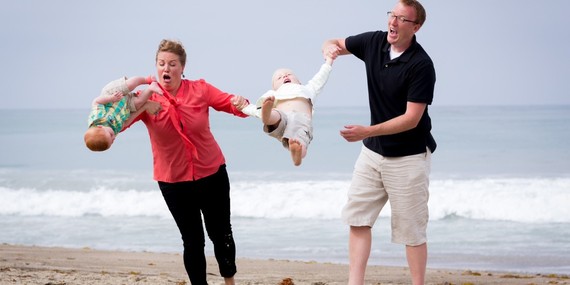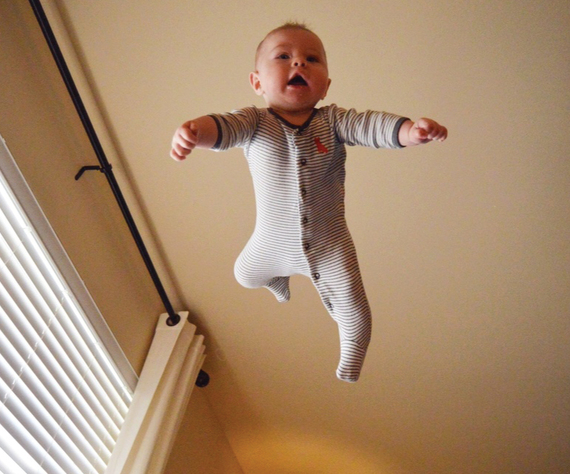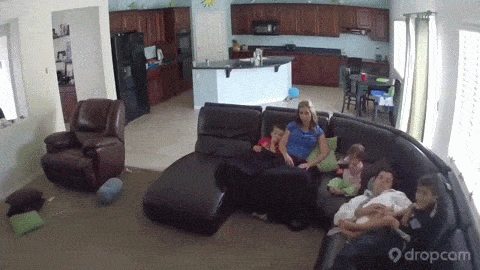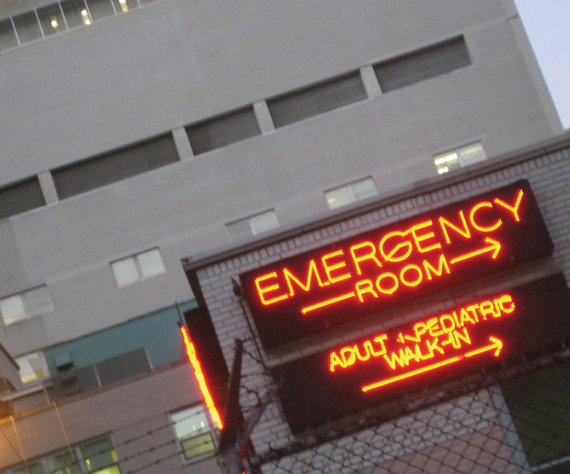This post originally appeared on Fatherly:
Holding an adorable, innocent, and defenseless baby, you can't avoid thinking two things: "Look at this adorable, innocent, and defenseless baby," and, "Don'tdropitdon'tdropitdon'tdropit." But shoot the breeze enough with your fellow parents and you'll discover lots of them have dropped their babies, which they'll usually admit while saying something like, "He's fine -- they're really tough, you know." Since that's not exactly reassuring, and since there's an apparently high likelihood that you might drop your baby at some point, you need to know when it's appropriate to freak out and if you just physically or emotionally scarred the kid for life.
Short answers? Never, and probably not.
That's according to nationally renowned parenting expert, Dr. Jen Trachtenberg, a member of Fatherly's expert advisory panel and a Fellow of the American Academy of Pediatrics. Whatever you're terrified of doing, you can bet Dr. Jen has already dealt with some other parent who just did. And, much like you will be, that kid is probably fine. They're really tough, you know.
When Falls Occur
The three most common drop scenarios in Dr. Jen's 20 years on the job are rolling off a bed, rolling off a changing table, or rolling off an exhausted parent. In other words, when you're multitasking, rushing, or tired, you're much more likely to lose your grip -- literally and figuratively.
How To Prevent Them
To put it bluntly, don't let any of that stuff happen. A few failsafe measures: 1) Pillows are not effective barriers; 2) A carrier works just as well for passing out in a rocking chair as strolling around the block. Most importantly, recognize that it's just impossible for you to prevent anything bad from ever happening to your kid. "When you have a new baby, especially for the first time, and have to take care of all their needs, 24-7, there's such overwhelming anxiety and fear that parents become paralyzed," Dr. Jen says. "They're scared that if anything happens, they're terrible parents. And that's just not true."
What Can Happen
If they fall a short distance onto a soft surface, most likely nothing. Yes, you need to be careful with babies' heads, but some parents are too paranoid. Dr. Jen frequently has to tell dads who are afraid of their kids' necks flopping back and breaking or their "soft spot" popping, "It just doesn't happen." The danger occurs when they fall onto a hard surface from a height of 3-5 feet or more. Broken limbs, retinal hemorrhages, skull fractures, brain damage or swelling, and internal bleeding are the most severe scenarios. Luckily, these are rare and their effects can be minimized with decisive action.
"This is an accident, not ongoing toxic stress. If you have an appropriate response, that's what will make them secure."
How To Respond
In a word, calmly. "You're probably much more upset than the baby is," Dr. Jen says. "This is an accident, not ongoing toxic stress. If you have an appropriate response, that's what will make them secure." So take a deep breath, recover your fumble, and just hold them and try to calm them as you would if they were screaming at 2 AM. You should be well-practiced at that. Then, assess the situation.
When It's Okay
If your baby calms down after a few minutes and is playing in your lap, smiling at you, and distracted by toys per usual, you're probably in the clear. Give 'em a quick once-over; check for bumps and bruises and move their arms and legs. If they're acting like themselves, save yourself the trip to Dr. Jen's office. "There will always be accidents or mishaps or issues that come up along the way. It's how you deal with them that's actually important."
When It's Definitely Not
You want to look for emotional or behavioral extremes. A major red flag: no crying. A conscious, startled baby will start wailing away, ASAP. If they're vomiting or inconsolable, or you notice any bumps, bruises, or more serious symptoms noted above, get ye to a Dr. (Jen). And don't forget about the extremities. "Sometimes people get so worried about the head they forget about the arms and legs." They won't move one if it really hurts, which can be a sign of a more serious injury.
When It Stops Mattering
Technically never, but after they pull through that first accident unscathed, your crippling paranoia will quickly disintegrate. If it persists, just wait until Kid #2 shows up. By then you'll forget about your endless list of precautions and focus on what's important: filming Kid #1 smacking Kid #2 on the head. According to Dr. Jen, it goes something like this: "'Isn't that so cute the way Number 1 holds Number 2?' Then boom, they topple on top of each other. It's totally okay."
Check out those dad-like reflexes.
Posted by Fatherly on Monday, August 17, 2015
More stories you'll like from Fatherly:
Also on HuffPost:




